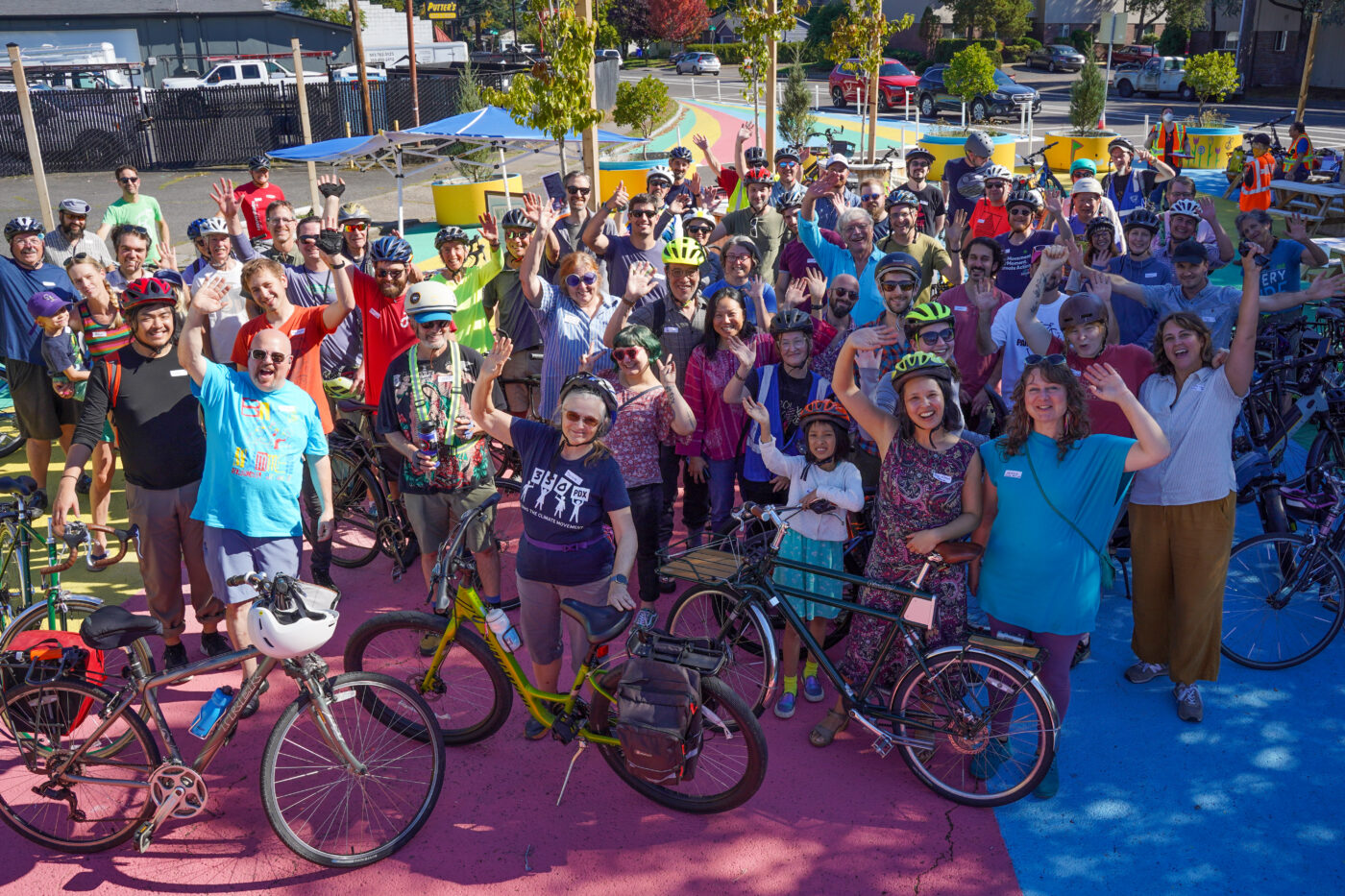
Can a story about how east Portlanders are working together to solve our city’s most daunting challenges be told in one afternoon on a bike ride?
That was the challenge organizers of the 14th annual Bike Town Hall accepted on Sunday, when they led about 70 people on a short route through the Mt. Scott and Lents neighborhoods that stopped for conversations and presentations on street corners, plazas, and nonprofit headquarters. And while they only scratched the surface of the impressive government and community-led efforts underway in this part of our city, everyone came away with a much better awareness of issues we face — and more importantly — who’s doing what to address them, and how to get involved.
The Bike Town Hall was first held in 2009. When Senator Michael Dembrow (then a House representative), and former Senator Jackie Dingfelder announced the inaugural event, they billed it as a “new kind of town hall” that would showcase their interest in bicycling and provide a perfect way to connect with community projects and constituents.
15 years later (they skipped 2020 due to Covid), the event is stronger than ever.

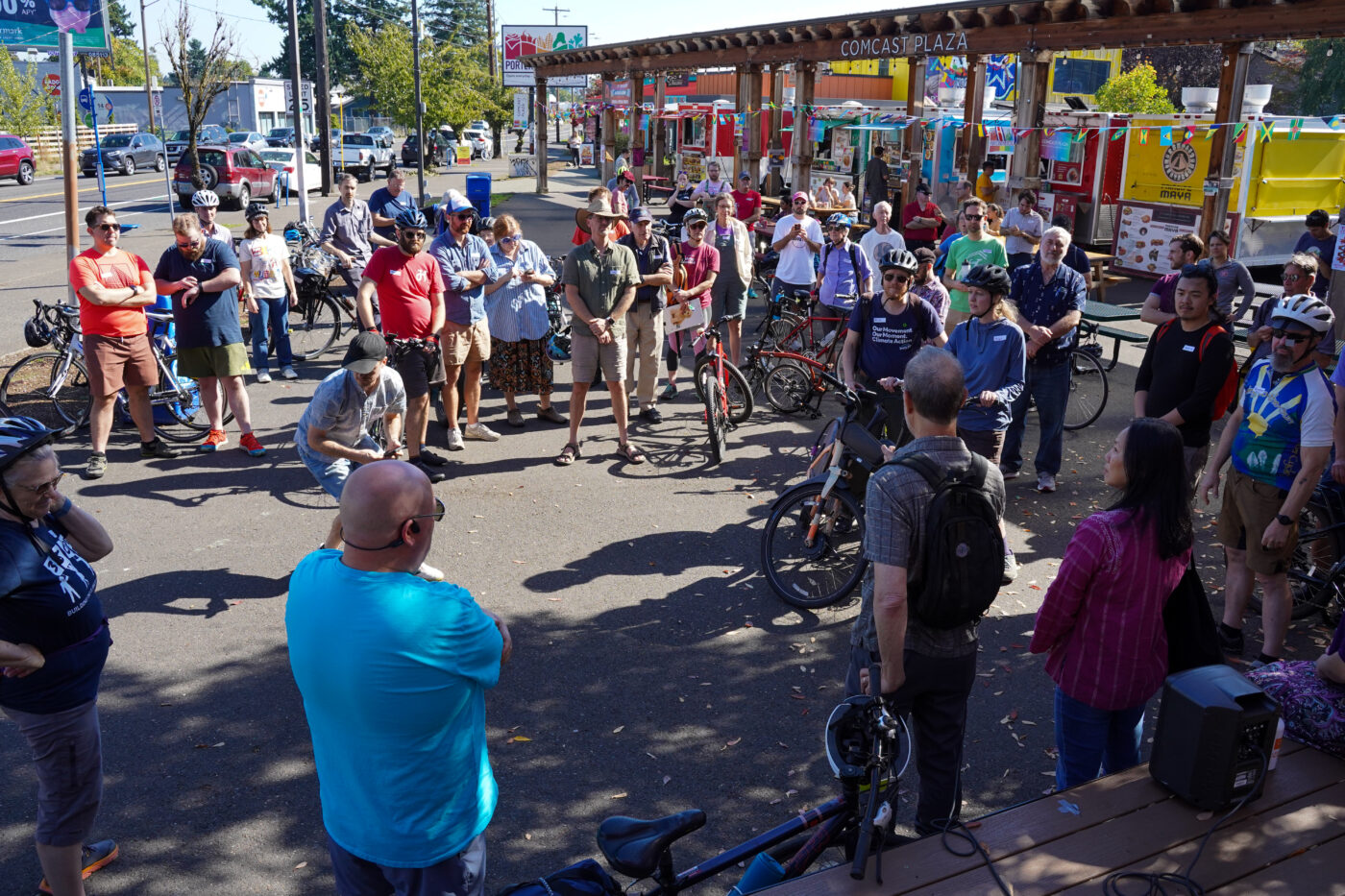
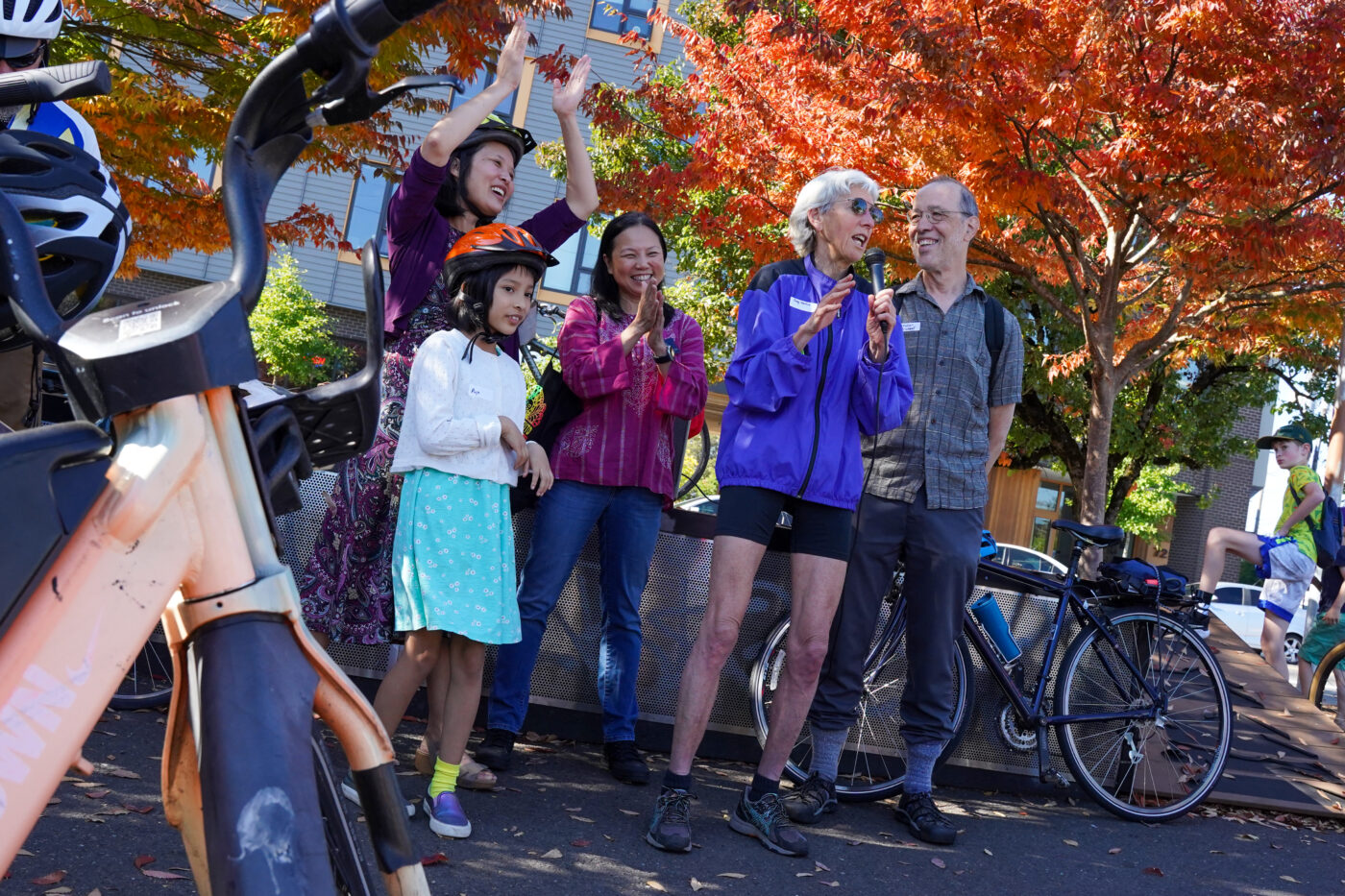
Dembrow has hosted all 14 town halls, but the Portland Democrat bid the event a “bittersweet” goodbye Sunday, since he’ll retire at the end of his current term. “Certainly, we could have gotten into cars to go from project to project,” he shared as he recalled the inspiration for the event in remarks before Sunday’s ride, “But that was not going to happen. We could have maybe walked; but that would have taken all day. And so biking just made the most sense.”
“We’re able to cover so much ground and learn so much in just two or three hours — getting up-close and personal to what people are doing, to confront challenges and to make this a better place,” he added.
Stops on the route featured speakers on the issues of community safety, public space, transportation, housing, economic development, climate change, and alternatives to policing.
Dembrow was one of three legislators who led Sunday’s ride. The others were House representatives Thuy Tran (District 45), and Khanh Pham (District 46).
Rep. Tran didn’t feel comfortable riding a bike, so she hopped inside a pedicab operated by Kiel Johnson of Go By Bike. “I hope to open this event up to folks who, because of health reasons or fear of fast traffic may not want to participate with us,” she said.
And Rep. Pham, who’s running to replace Dembrow in the Senate and will very likely win the seat, called the Bike Town Hall her favorite constituent event of the year.
“But just as important as the programs that we’re going to highlight [on the ride], it’s also the journey itself,” Pham told the crowd, at the Mercado. “We’re going to be able to see the state of our roads, the experience of bicyclists and pedestrians as they try to traverse this neighborhood… As a mom who tries to get her kid to school safely every single day, I know what it’s like for parents who are trying to provide that safe experience for their kids, but are have to dodge 40 mile per hour traffic and really dangerous streets.”
And with that, PSU Senior Fellow at the Center for Public Service Jeff Hammarlund grabbed the mic and reminded the crowd of the power of community by encouraging everyone to join him in the singing of “Step by Step” by Pete Seeger:
“Step by step, the longest march / Can be won, can be won / Many stones can form an arch / Singly none, singly none / And by union what we will / Can be accomplished still / Drops of water turn a mill / Singly none, singly none”
It was a fitting tune, as the ride’s itinerary included stops to learn about programs and projects that exemplify how individual Portlanders have stepped up and done big things, together.
The first stop was nearby Arleta Triangle Square, a former wide slip-lane and derelict traffic island overgrown with blackberry bushes that was transformed into a carfree community space last year. An effort that started with neighbors coming together in 2005, has resulted in a public plaza that has reduced vehicle-based gun violence and now hosts markets, dances, and live music.
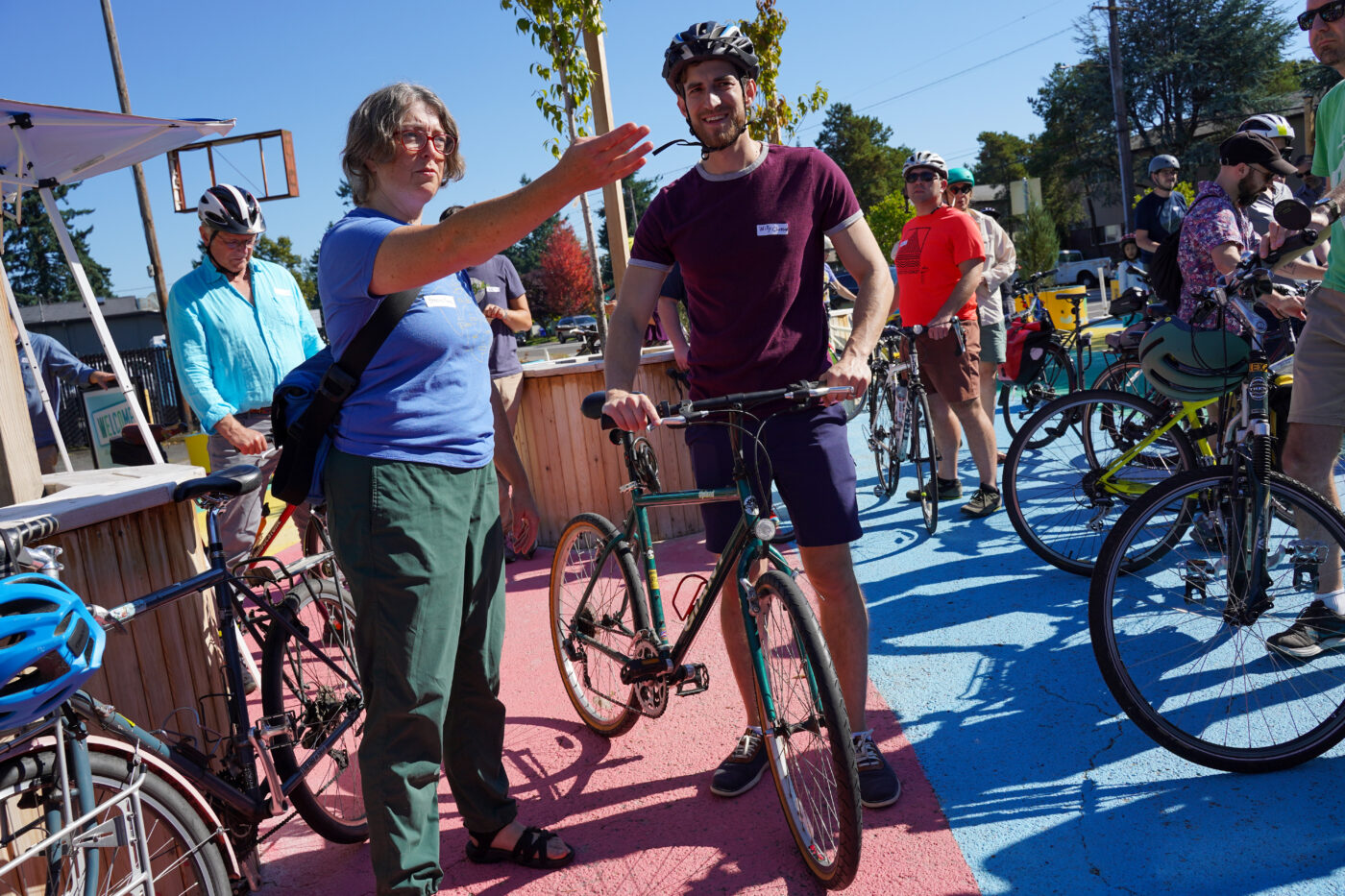
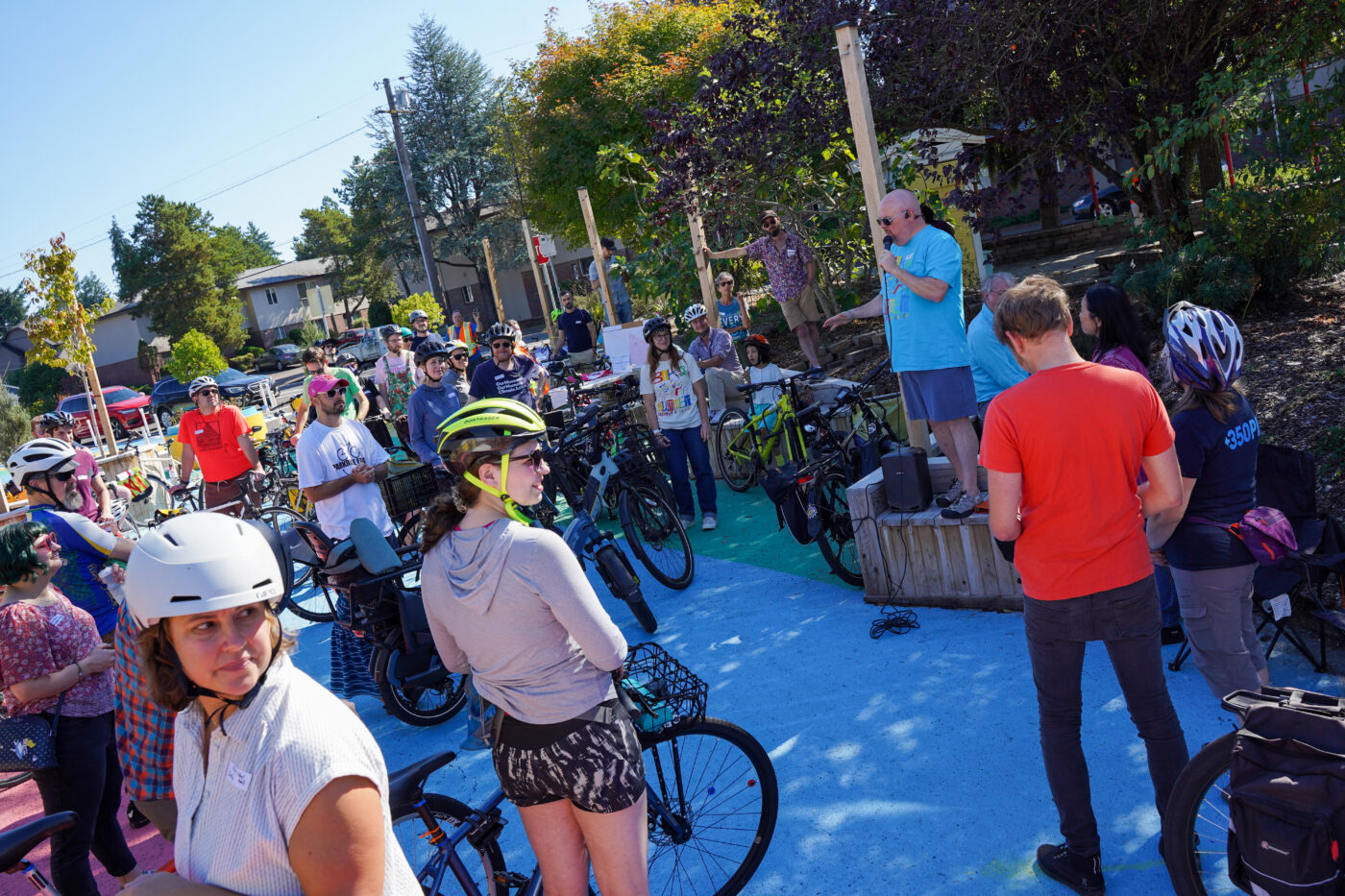
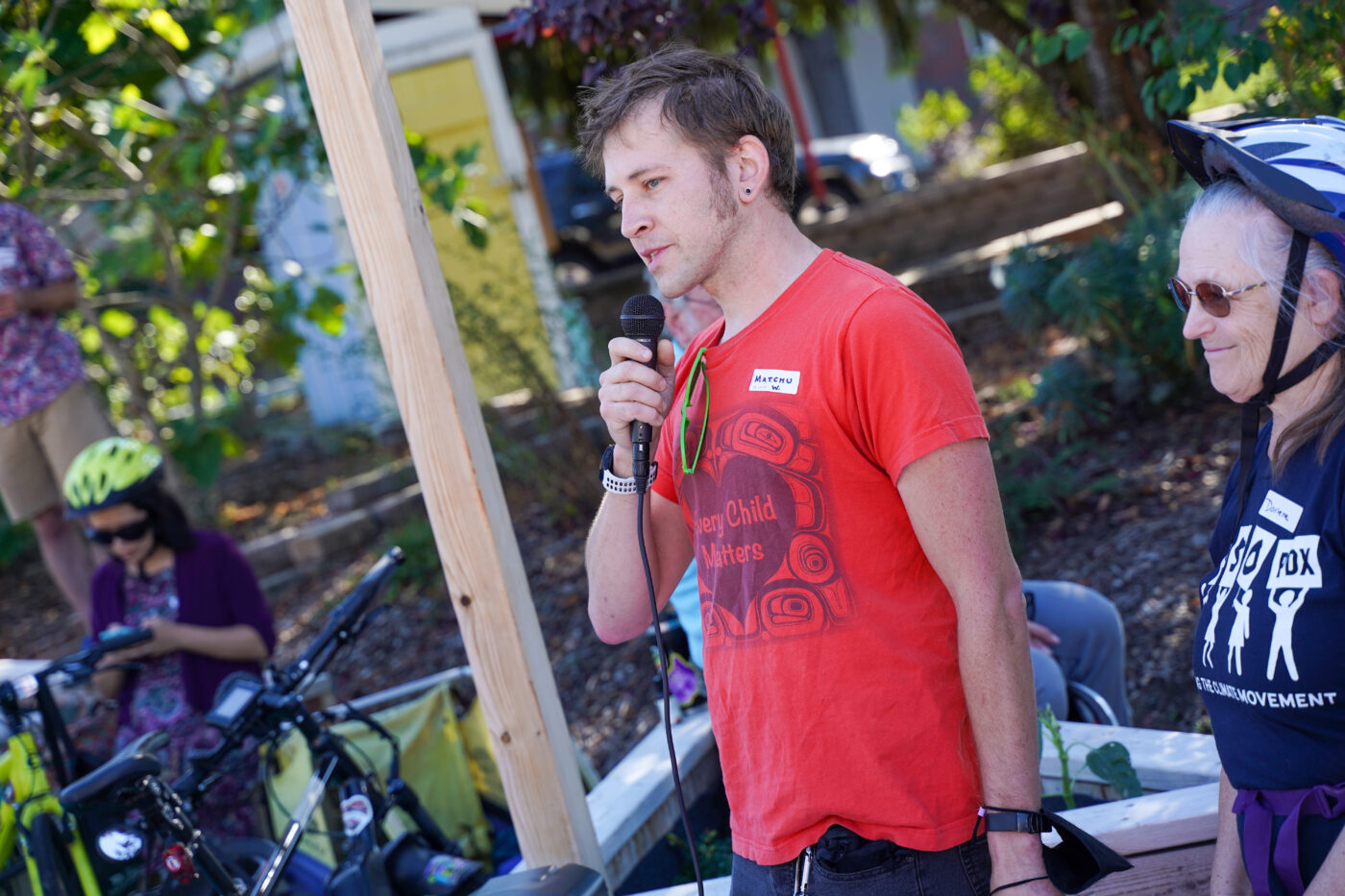
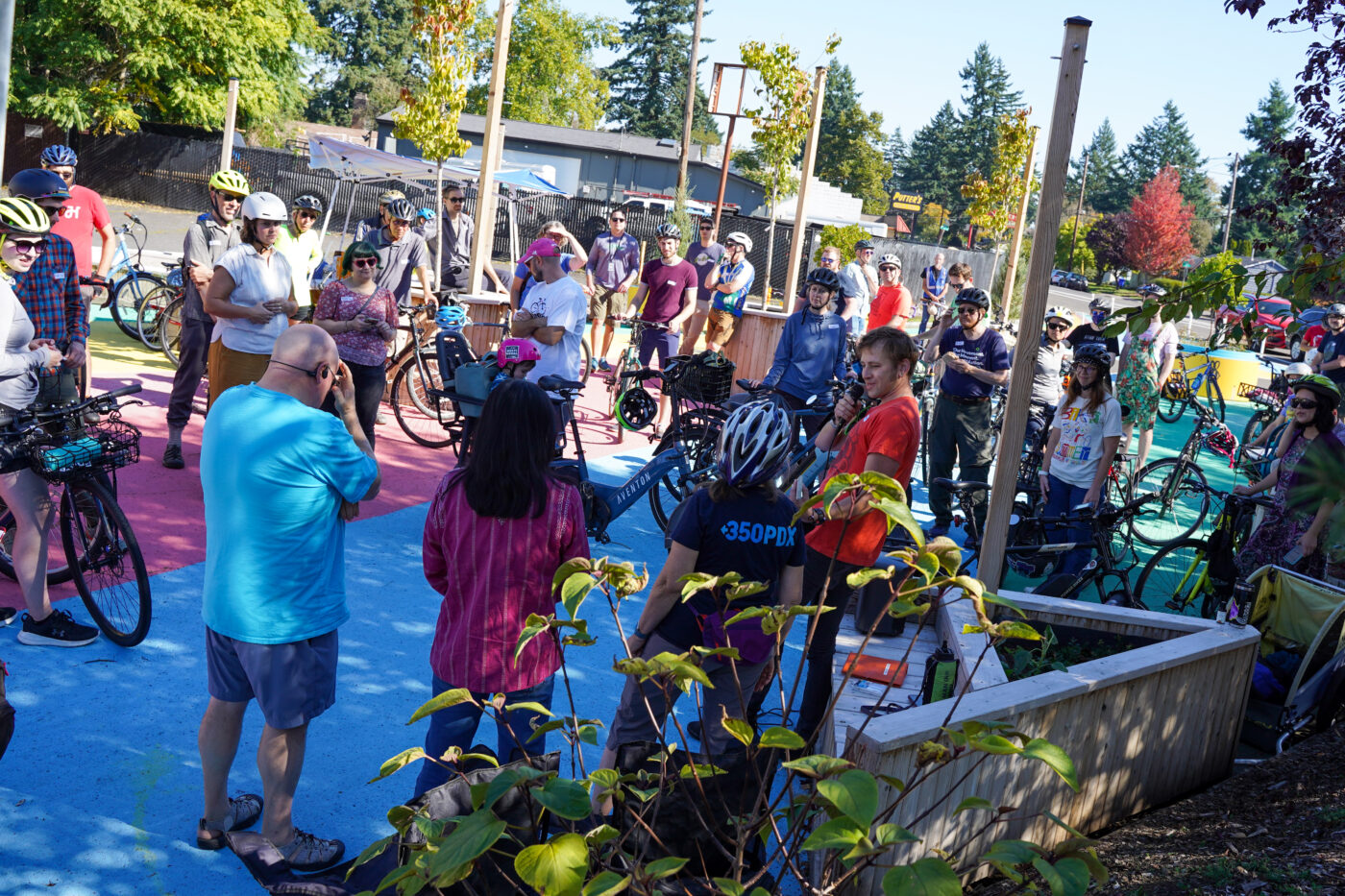
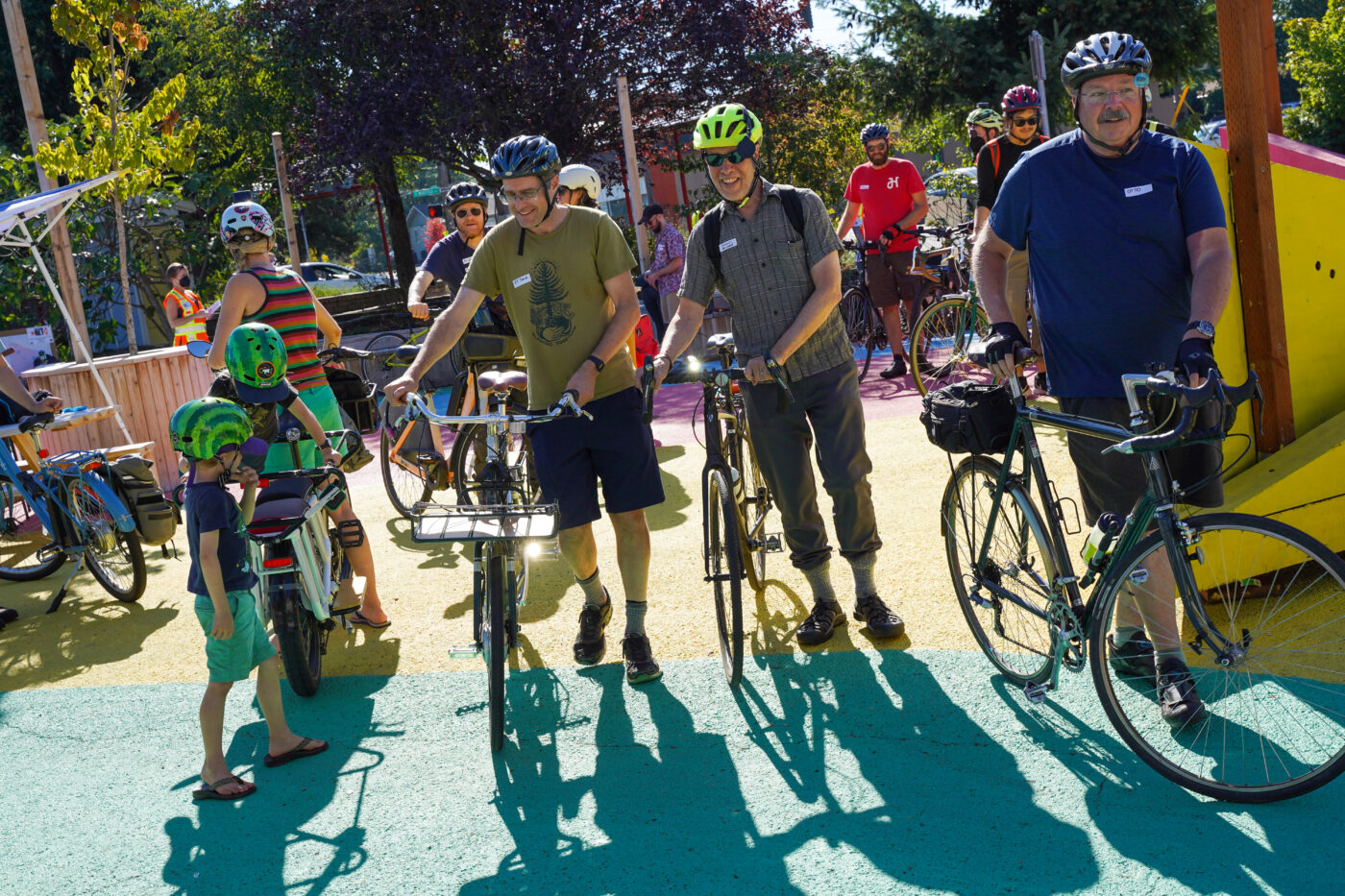
The group then rolled over to the corner of SE Woodstock and 77th where a Portland Bureau of Transportation planner shared details on the 70s Neighborhood Greenway project — a $5 million dollar investment (split by a state grant and City of Portland development charges) that will be partially complete by the end of December. And in about two years when it’s all done we’ll have a safer, lower-stress cycling connection from the Springwater to Cully Park in northeast.
From a public plaza that addresses gun violence and a transportation project that will encourage less car use, the ride continued with a stop to highlight affordable housing issues and homelessness at Path Home on SE 92nd. Path Home is a shelter that serves families that have experienced trauma and are unable to find stable housing. With over half of their clients under 18, this shelter served 66 families in 2022 and offers a comprehensive suite of services far beyond just a place to sleep.
A few blocks away on SE Foster and 91st, the group learned the value of local businesses and economic development. Leaders from the Asian Pacific American Network of Oregon (APANO), Rose Community Development, and East Portland Action Plan (EPAP) shared an update on their work. All three of these nonprofits say they will align on an effort to create a new tax increment financing (TIF) district in east Portland that will invest directly in their communities.


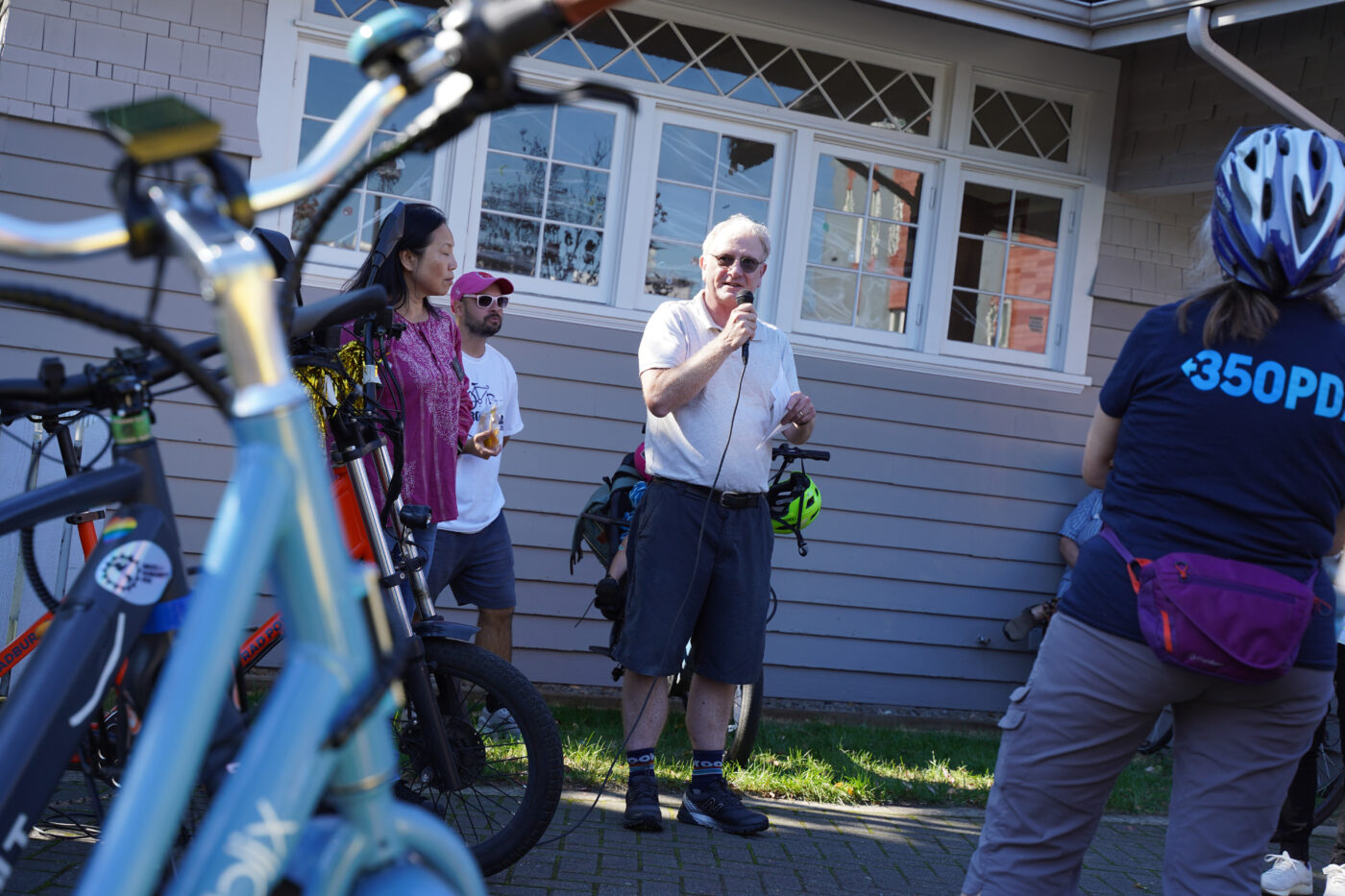
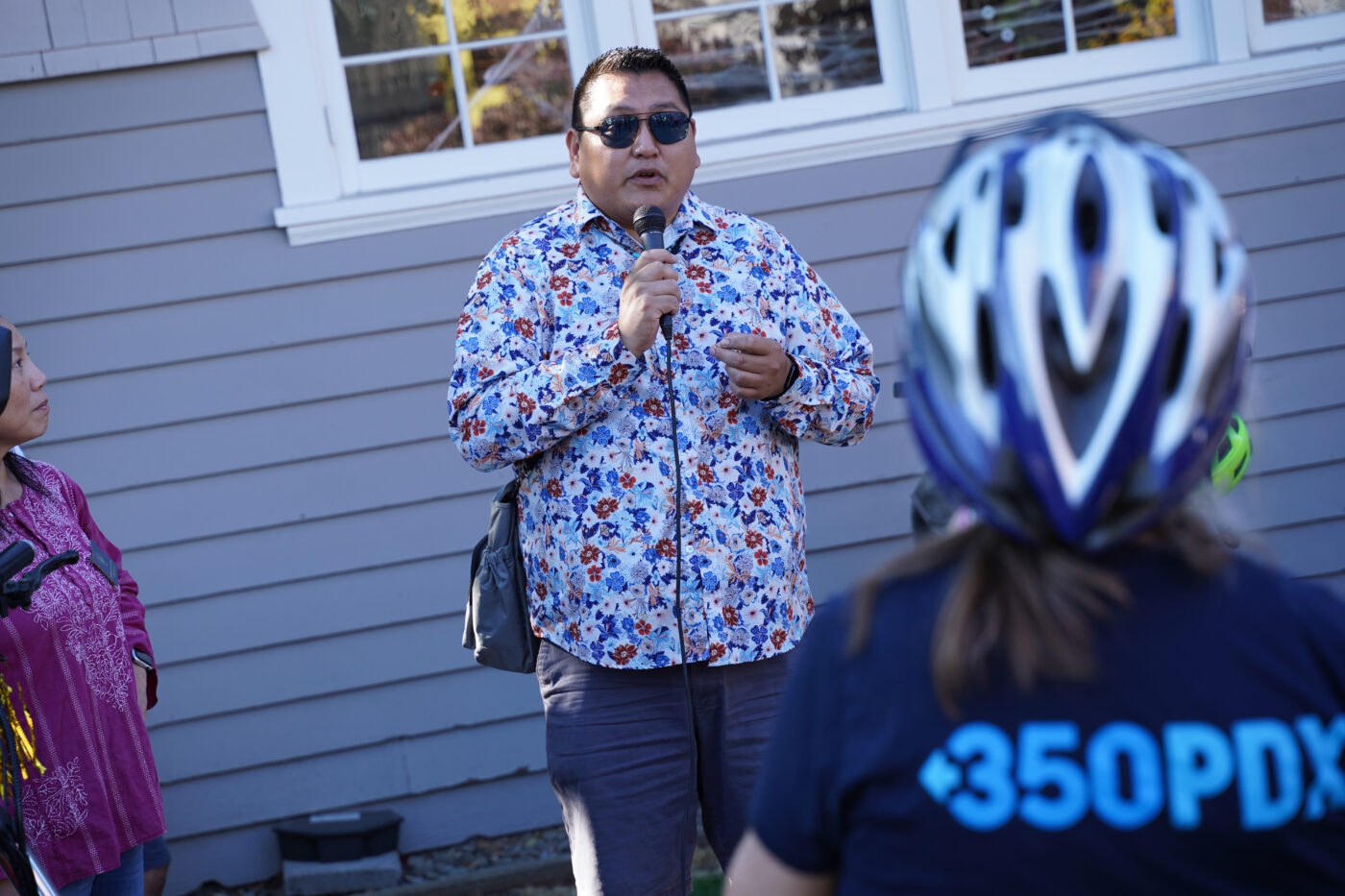
“We’ve seen the impact of what resources can do for a community,” said APANO Co-Executive Director Allie Yee, as she explained how working with business owners has built trust. “We’re seeing how this investment in community is building not just stabilization, but resilience and ownership of the broader community. And so we are really excited to see what the potential impact of larger TIF funding can be.”
JR Lilly, a member of the Navajo Nation who works on economic development for EPAP, pointed out how east Portland is one of the main employee bases for jobs in the Columbia Corridor — an industrial zone in northeast (between Lombard and the Columbia River). “It takes an average of 45 minutes to get to work, so there’s a big need for transportation infrastructure,” he said.
The group then rolled onto the I-205 path and across the freeway to Lent Elementary School to learn about how schools are battling climate change. Kat Davis, who works on climate justice for Portland Public Schools, explained her efforts to create “green school yards.”
“There’s a sea of asphalt back there,” Davis told the group, who had assembled in the street outside the school. “I think that that made sense at one point in time… and now we’re realizing that it’s actually not a great solution for our urban heat island effect.” Davis has received funding through the Portland Clean Energy Fund to plant trees and depave parts of PPS playgrounds.
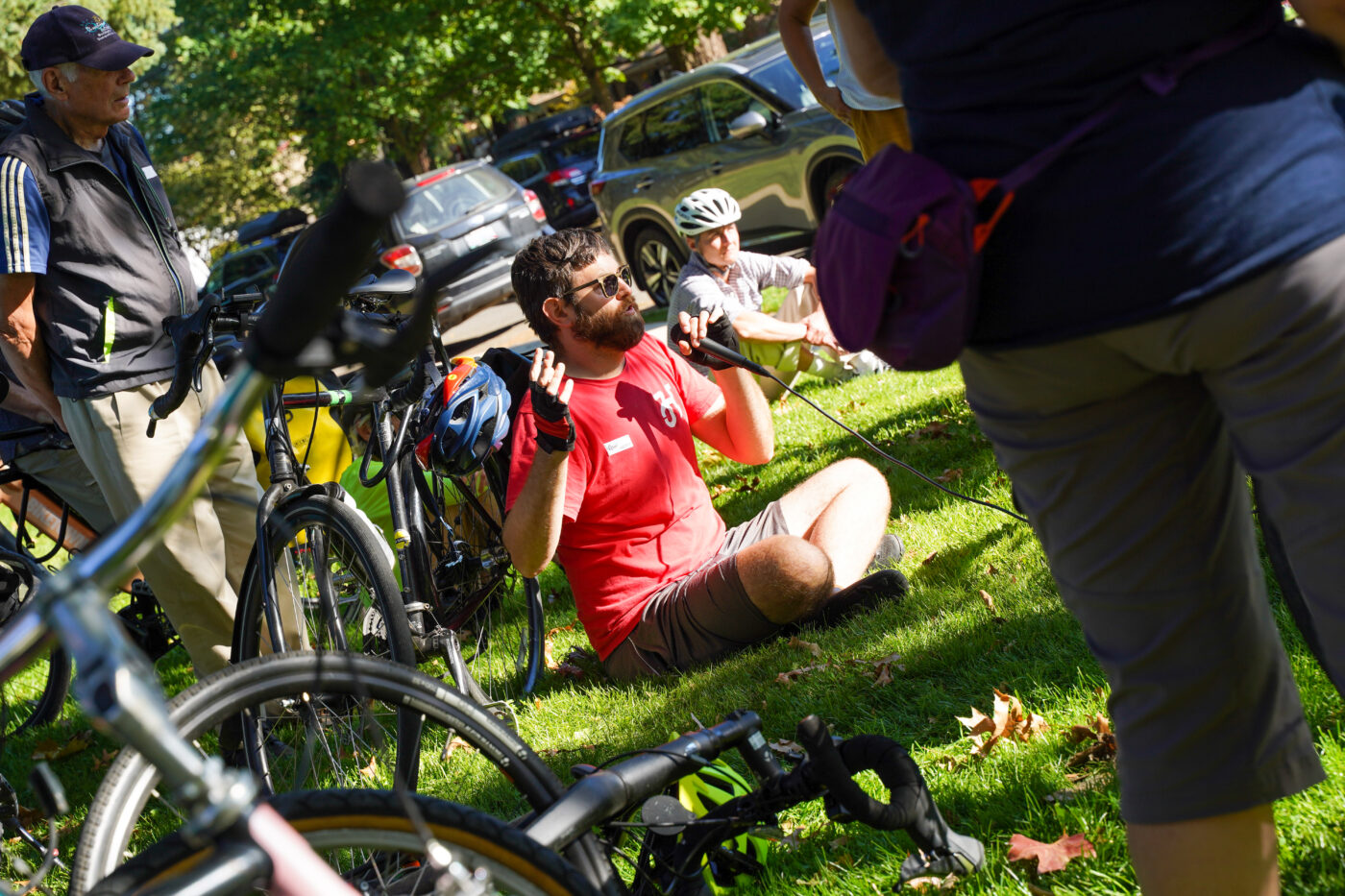
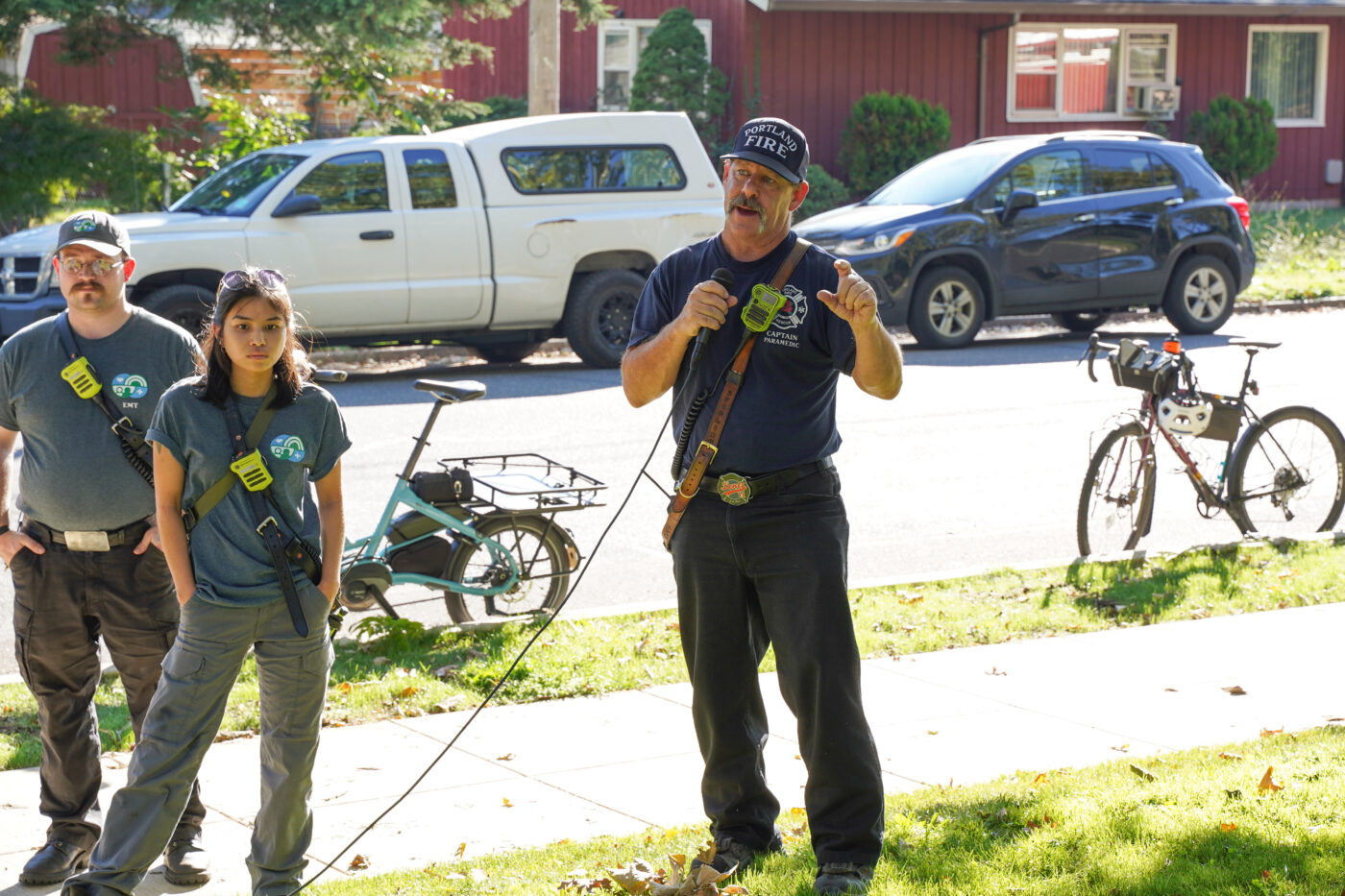
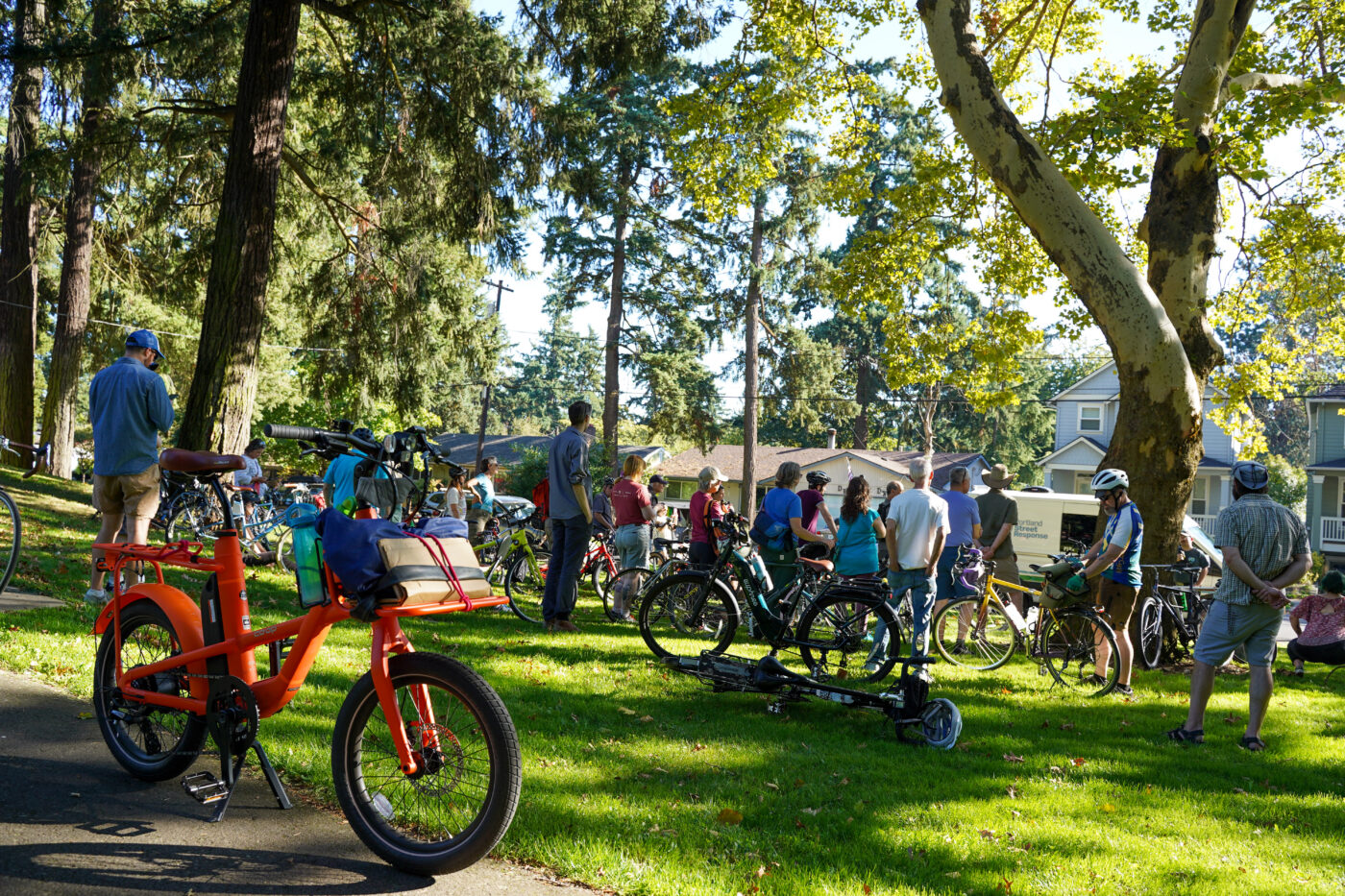
After the stop at Lent Elementary, the group rolled back over the Steele Street overcrossing of I-205 to the final stop at Lents Park where they heard about Portland Street Response, whose leader described what they do as, “Providing that critical linkage between the 911 call and behavioral health, social service, and mental health systems of care.”
Portland Fire & Rescue Captain Chris Starling was also on hand. He said the Lents fire station is one of the busiest in the city and the presence and help they receive from PSR is very important. “We can’t keep using the same [tool] for the same problem, because then we’re not getting the right results,” he said, when asked about how PF&R works with PSR. “We have to bring other players to the table, we have to look at different ideas on how to deliver the service that is needed.”
And then Cpt. Starling made an analogy he felt the crowd could relate to. “If your tire got a flat, you don’t call AAA. Everybody was calling us for everything that was broken. And we’re not always the answer.”
So, did the organizers succeed in their mission to tell a big story in just a few hours on a bike ride? Yes.
Of course the full story of Sunday’s event includes many more connections and conversations among friends old and new that this reporter isn’t privy to. “I think there’s just something about being together and the open air that I find really refreshing and energizing,” Rep. Pham shared with me while she pedaled her Rad Power e-cargo bike with her third-grade daughter seated in the rear. “On a bike, you stop and chat. And those are the kinds of community bonds that we’re going to need. That’s how we’re going to build resilience in the face of what are going to be really challenging times in the future.”
That may be true. But after being on Sunday’s ride and realizing all people working to make Portland a better place, the future seems a lot less gloomy.
More photos from the ride below:

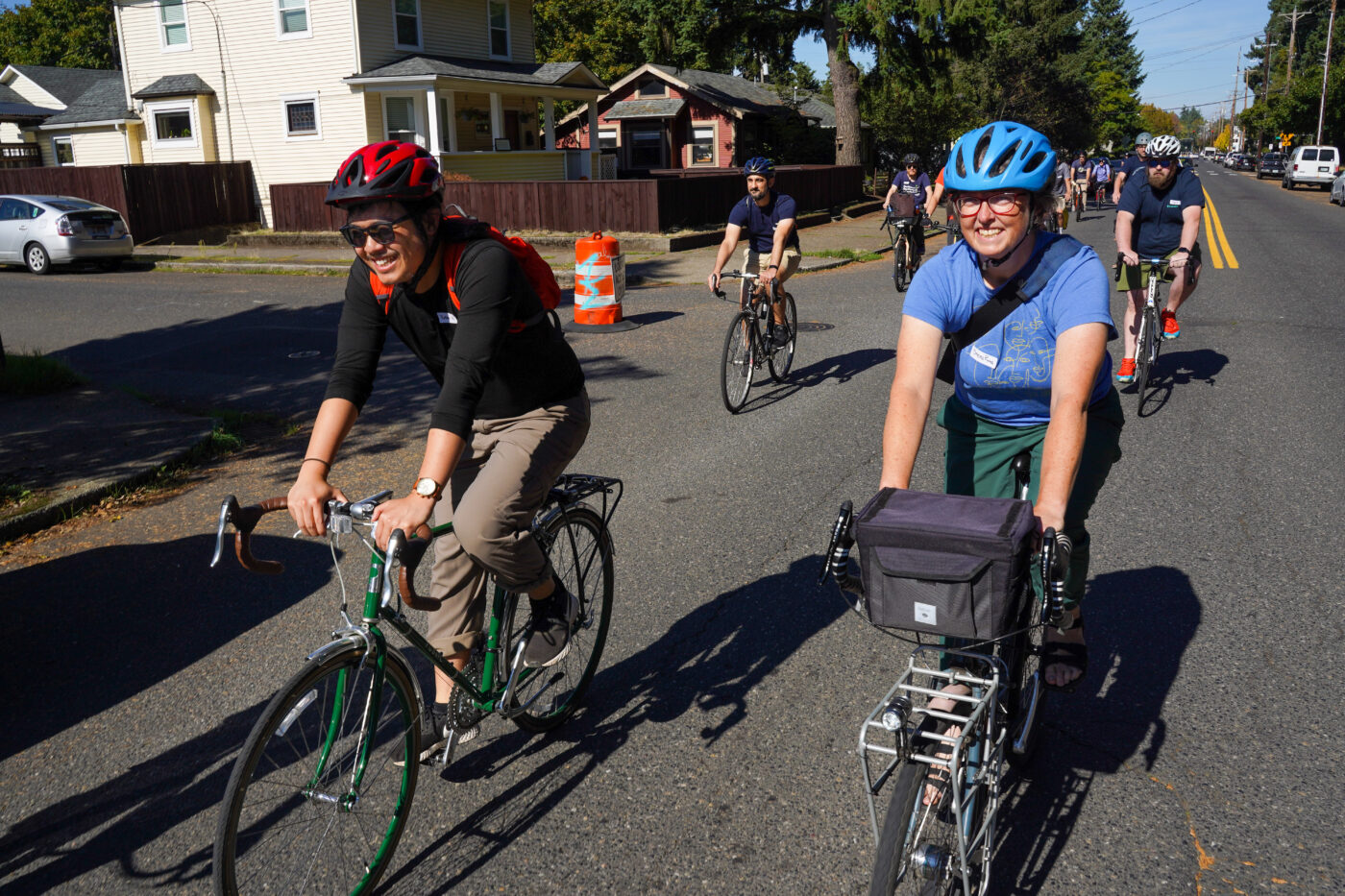
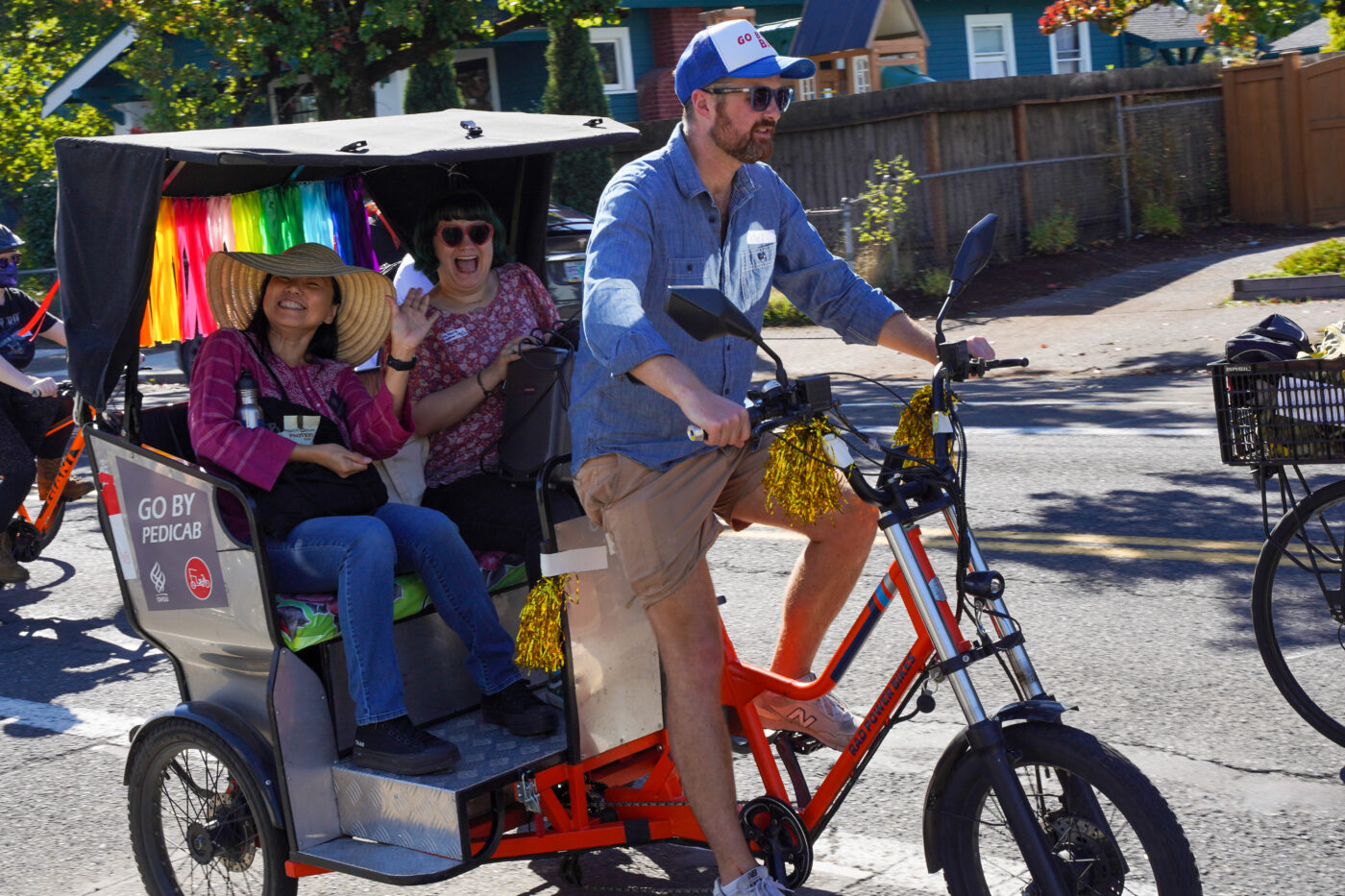

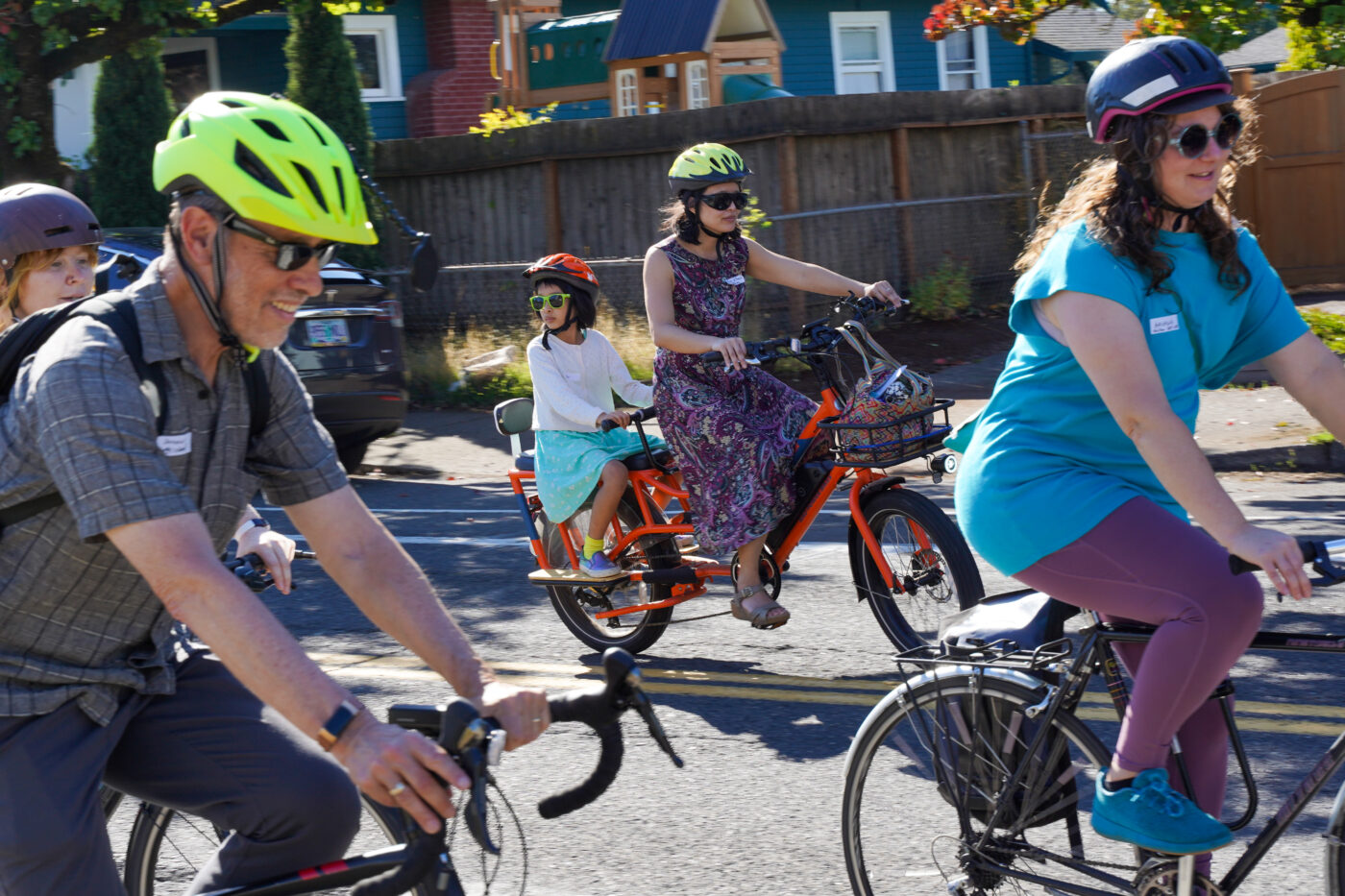



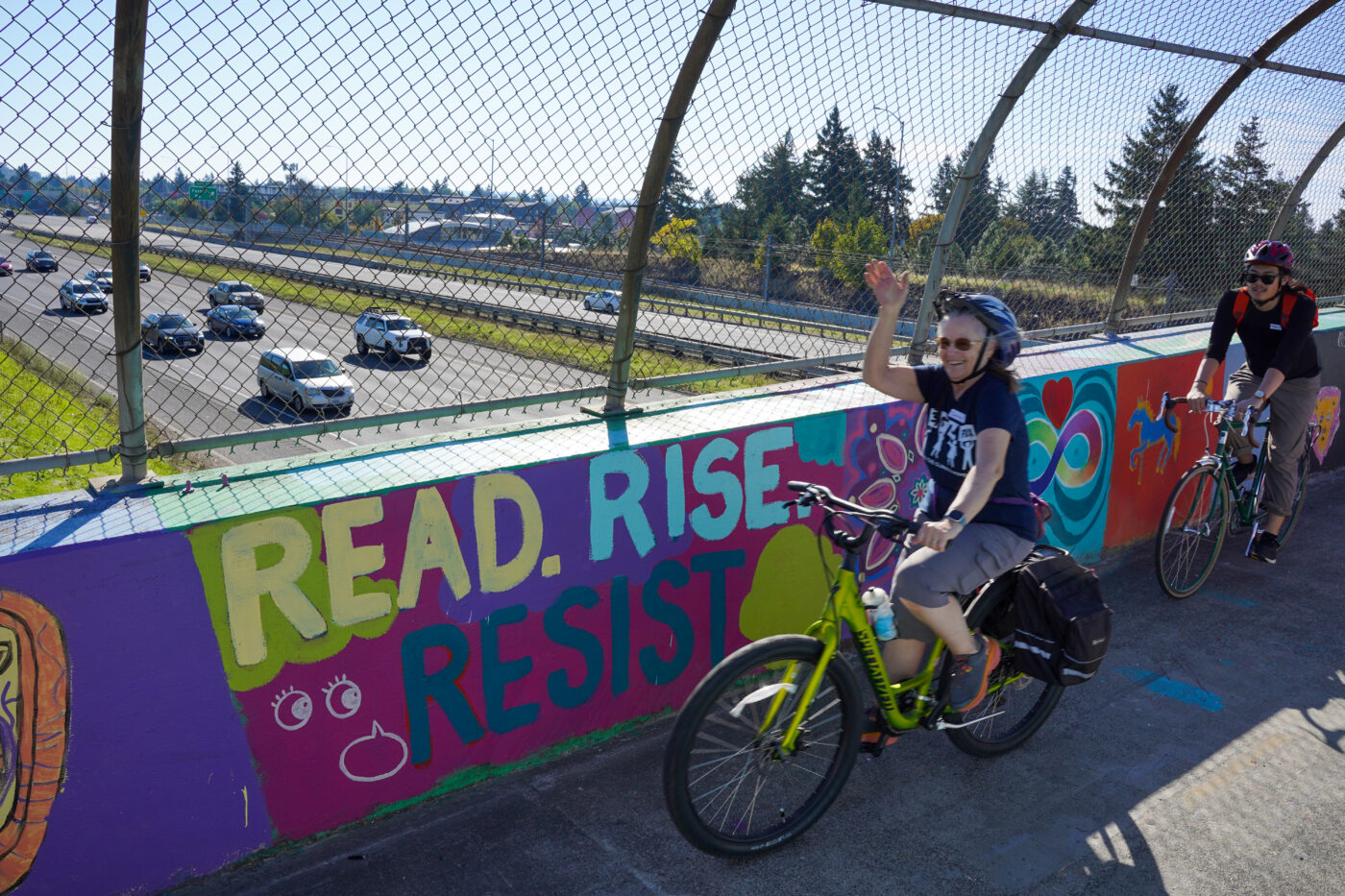
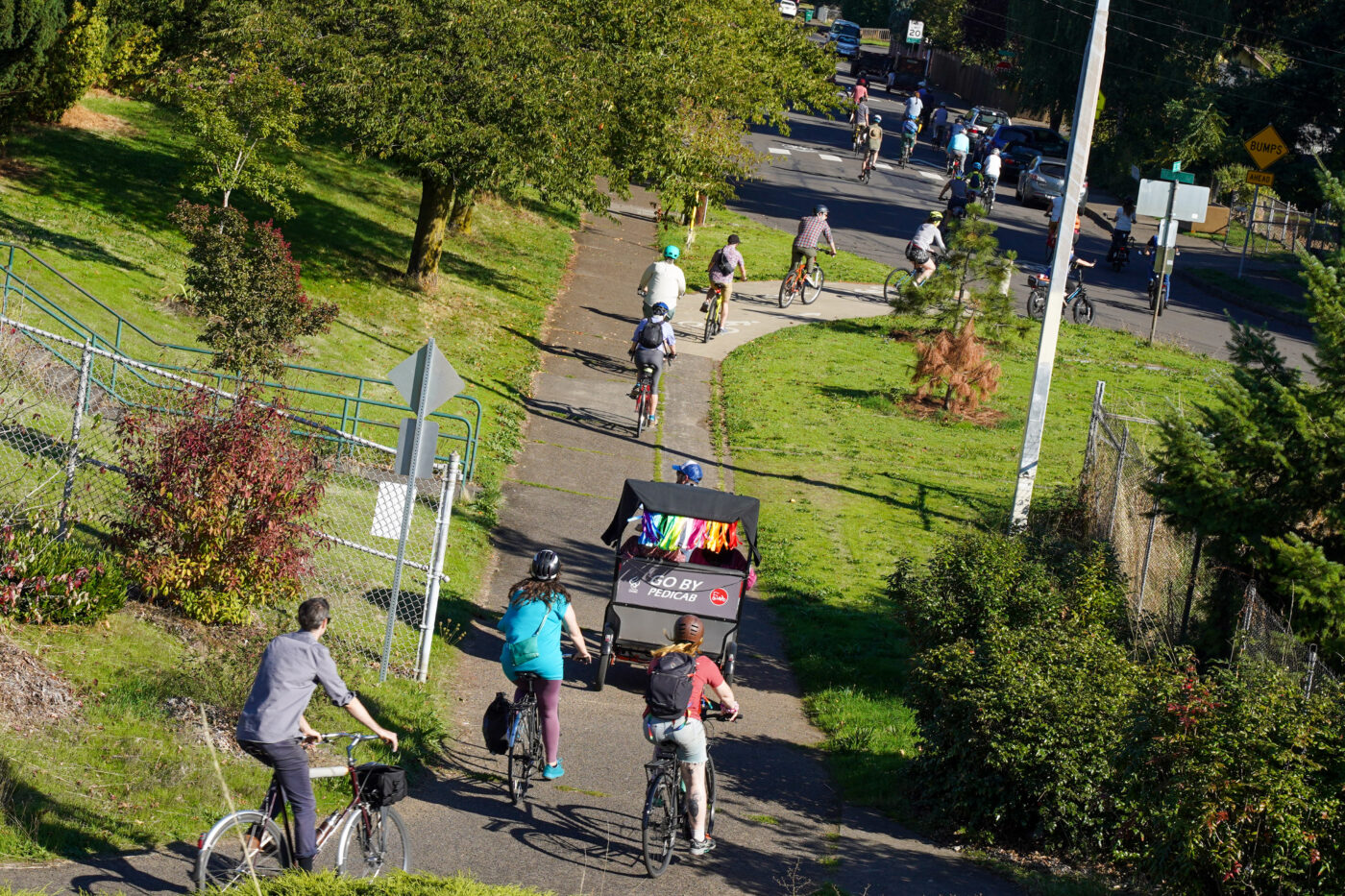
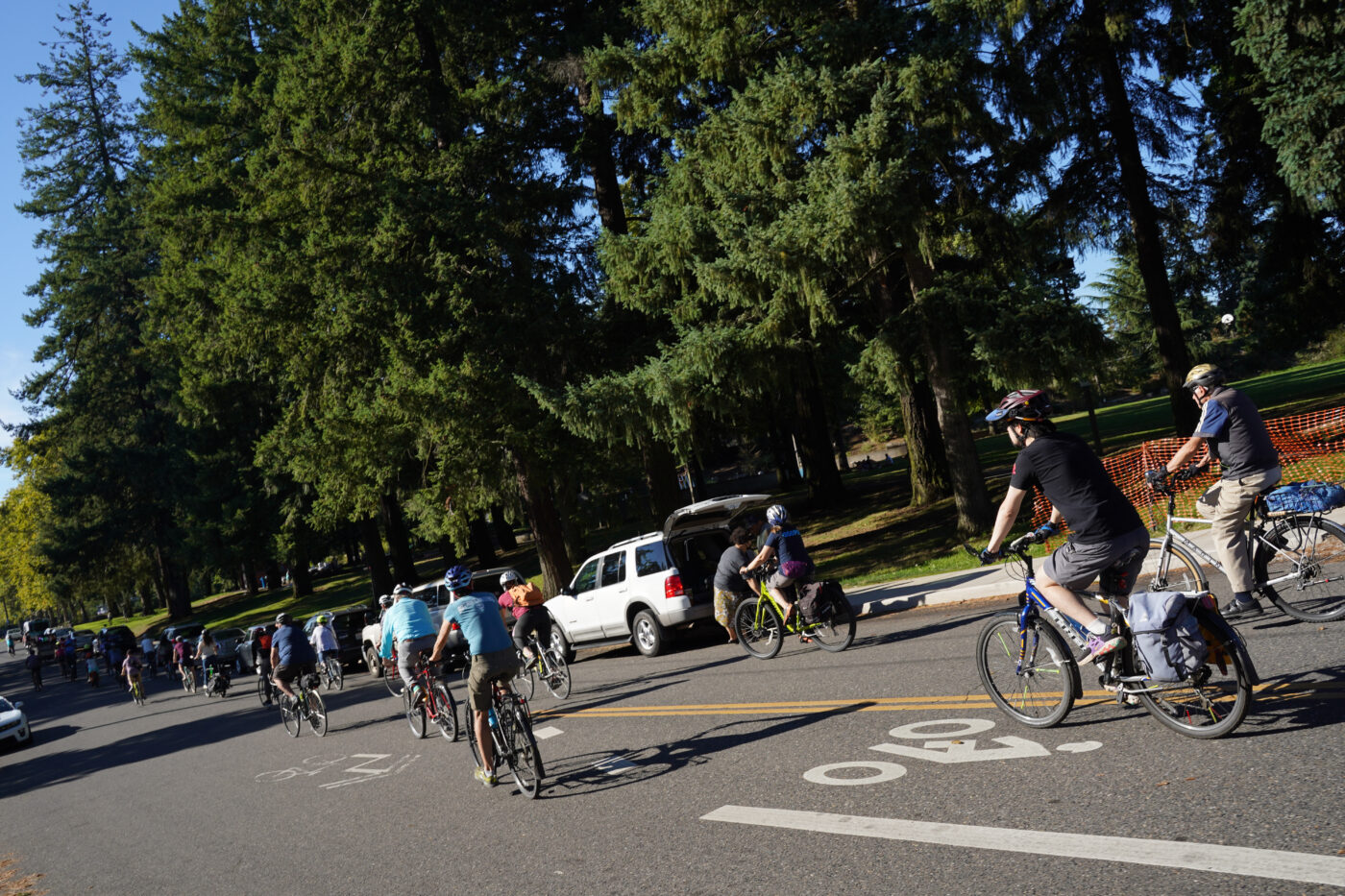

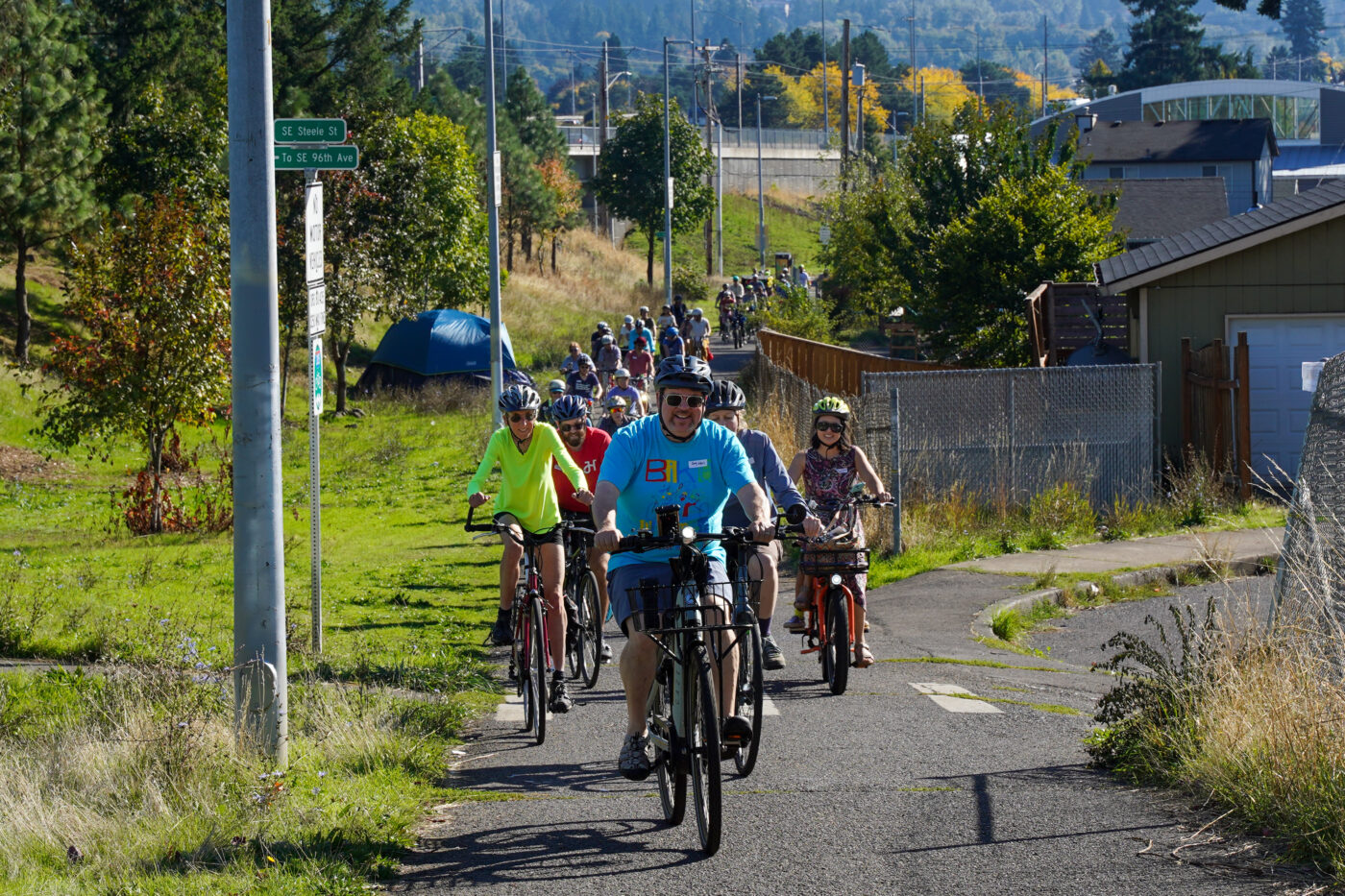



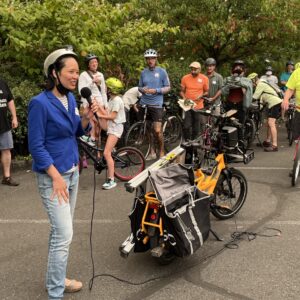

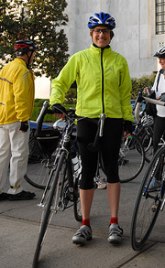

Thanks for reading.
BikePortland has served this community with independent community journalism since 2005. We rely on subscriptions from readers like you to survive. Your financial support is vital in keeping this valuable resource alive and well.
Please subscribe today to strengthen and expand our work.
Technically EPAP is a city project and not a nonprofit, but I can fully understand why people might think it is a nonprofit.
Sen. Dembrow deserves kudos for starting the bike town hall and keeping it going for so many years. It’s telling, however, that he’s a state legislator and this event was run at the state level. Why don’t city leaders do something like this? Or have they and I just missed it?
The big danger, of course, is that an event like this is all performative and doesn’t lead to tangible improvements in cycling infrastructure.